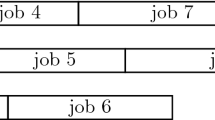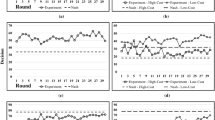Abstract
We study experimentally in the laboratory two 2-player games that mimic a decentralized decision-making situation in which firms repeatedly outsource production orders to multiple identical suppliers. The first game has a unique (inefficient) equilibrium in mixed strategies, while the second game has two (efficient) equilibria in pure strategies and an infinite number of (inefficient) equilibria in mixed strategies. In both games, the optimal social costs can also be obtained via dominated strategies. We find that only in the second game subjects manage to reach an efficient outcome more often when matched in fixed pairs than when randomly rematched each round. Surprisingly, this is because subjects coordinate on dominated strategies (and not an efficient pure strategy equilibrium). We show theoretically that preferences for efficiency cannot explain our experimental results. Inequality aversion, on the other hand, cannot be rejected.




Similar content being viewed by others
Notes
Obviously, since the outsourcing problem has a very simple structure, our study should be regarded as a first step in a full-fledged analysis. Indeed, the advantage of its simplicity is that future experimental studies can incorporate more complex real-life features and then more easily determine how these additional features affect behavior and outcomes.
In case one player owns the two shortest jobs (A and B) his only optimal decision is to send his jobs to different machines. And consequently, the other player’s optimal decision is also to send his jobs to different machines (in any of the two possible ways).
The estimated frequencies of coordination on exterior profiles are 0.0067 in game AC and 0.0084 in game AD.
References
Bolton, G., & Ockenfels, A. (2000). ERC: A theory of equity, reciprocity, and competition. American Economic Review, 90, 166–193.
Braat, J., Hamers, H., Klijn, F., Slikker, M.(2015). Selfish allocation heuristic in scheduling: Equilibrium and inefficiency bound analysis. Working Paper, Version: January 2015.
Brandts, J., & Cooper, D. (2006). A change would do you good: An experimental study of how to overcome coordination failure in organizations. American Economic Review, 96, 669–693.
Brandts, J., Cooper, D., & Fatas, E. (2007). Leadership and overcoming coordination failure with asymmetric costs. Experimental Economics, 10, 269–284.
Clark, K., & Sefton, M. (2001). Repeating and signalling: Experimental evidence from games with efficient equilibria. Economics Letters, 70, 357–362.
Cooper, R., DeJong, D., Forsythe, R., & Ross, T. (1989). Communication in the battle of the sexes game: Some experimental results. RAND Journal of Economics, 20, 569–587.
Cooper, R., DeJong, D., Forsythe, R., & Ross, T. (1990). Selection criteria in coordination games: Some experimental results. American Economic Review, 80, 218–233.
Cooper, R., DeJong, D., Forsythe, R., & Ross, T. (1992). Communication in coordination games: Some experimental results. Quarterly Journal of Economics, 107, 739–771.
Danz, D., Fehr, D., & Kübler, D. (2012). Information and beliefs in a repeated normal-form game. Experimental Economics, 15, 622–640.
Fehr, E., & Schmidt, K. (1999). A theory of fairness, competition, and cooperation. Quarterly Journal of Economics, 114, 817–868.
Fischbacher, U. (2007). Z-tree: Zürich toolbox for ready-made economic experiments. Experimental Economics, 10, 171–178.
Hamers, H., Klijn, F., Slikker, M. (2015). Implementation of optimal schedules in outsourcing with identical suppliers. Working Paper, Version: March 2015.
Hyndman, K., Kraiselburd, S., & Watson, N. (2014). Coordination in games with strategic complementarities: An experiment on fixed vs. random Matching. Production and Operations Management, 23, 221–238.
Hyndman, K., Ozbay, E., Schotter, A., & Ehrblatt, W. (2012). Convergence: An experimental study of teaching and learning in repeated games. Journal of the European Economic Association, 10, 573–604.
Li, X., & Wang, Q. (2007). Coordination mechanisms of supply chain systems. European Journal of Operational Research, 179, 1–16.
Perakis, G., & Roels, G. (2007). The price of anarchy in supply chains: Quantifying the efficiency of price-only contracts. Management Science, 53, 1249–1268.
Smith, W. (1956). Various optimizers for single-stage production. Naval Research Logistics Quarterly, 3, 59–66.
Terracol, A., & Vaksmann, J. (2009). Dumbing down rational players: Learning and teaching in an experimental game. Journal of Economic Behavior & Organization, 70, 54–71.
Author information
Authors and Affiliations
Corresponding author
Additional information
We thank a referee for useful comments and suggestions. F. Klijn gratefully acknowledges financial support from the Generalitat de Catalunya (2014-SGR-1064), the Spanish Ministry of Economy and Competitiveness through Plan Estatal de Investigación Científica y Técnica 2013–2016 (ECO2014-59302-P), and the Severo Ochoa Programme for Centres of Excellence in R&D (SEV-2015-0563). He also gratefully acknowledges financial support from the Fundación Ramón Areces. M. Vorsatz gratefully acknowledges financial support from the Fundación Ramón Areces and the Spanish Ministry of Economy and Competitiveness (ECO2012–31985 and ECO2015–65701–P).
Electronic supplementary material
Below is the link to the electronic supplementary material.
Rights and permissions
About this article
Cite this article
Klijn, F., Vorsatz, M. Outsourcing with identical suppliers and shortest-first policy: a laboratory experiment. Theory Decis 82, 597–615 (2017). https://doi.org/10.1007/s11238-016-9579-3
Published:
Issue Date:
DOI: https://doi.org/10.1007/s11238-016-9579-3




